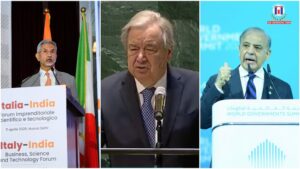
San Francisco, April 24 : A coalition of 12 U.S. states has filed a lawsuit against the administration of President Donald Trump, challenging the imposition of what they describe as “unlawful tariffs.” The case was brought before the U.S. Court of International Trade in New York on Wednesday.
The attorneys general of Arizona, Colorado, Connecticut, Delaware, Illinois, Maine, Minnesota, Nevada, New Mexico, New York, Oregon, and Vermont jointly filed the suit, seeking a court injunction to halt the enforcement of the tariffs by federal agencies.
According to the complaint, the administration’s tariff policy has left U.S. trade policy vulnerable to the President’s personal impulses, rather than being guided by lawful and reasoned authority. The states are asking the court to declare the tariffs illegal and to prohibit federal agencies and officials from implementing them.
The lawsuit emphasizes that the President can only invoke the emergency powers under the International Emergency Economic Powers Act (IEEPA) in the face of an “unusual and extraordinary threat” originating from outside the country.
“By claiming the unilateral power to impose sweeping and constantly shifting tariffs on any imports he deems fit, under the guise of an emergency, the President has disrupted the constitutional balance and sowed confusion in the U.S. economy,” the legal filing stated.
New York Attorney General Letitia James’ office said in a statement, “Congress never granted the President the authority to impose these tariffs. Enacting them via executive orders, social media proclamations, and agency directives is a clear violation of the law.”
James warned that the tariffs, if not reversed, could fuel inflation, lead to job losses, and cause broader economic harm.
Echoing those concerns, New York Governor Kathy Hochul said, “President Trump’s reckless tariff policy has driven up prices for American consumers and created economic uncertainty nationwide.”
Responding to the lawsuit, White House spokesperson Kush Desai said the administration remains firm in its commitment to confronting what it views as a national crisis damaging U.S. industries and workers. “We will continue to use every available tool, from tariffs to negotiations, to address this emergency,” Desai stated.
Earlier, on April 2, President Trump signed an executive order invoking the IEEPA to declare a national emergency and enforce “reciprocal tariffs” on all U.S. trading partners. The decision drew sharp criticism both domestically and abroad, triggering volatility in global financial markets.















No Comments: